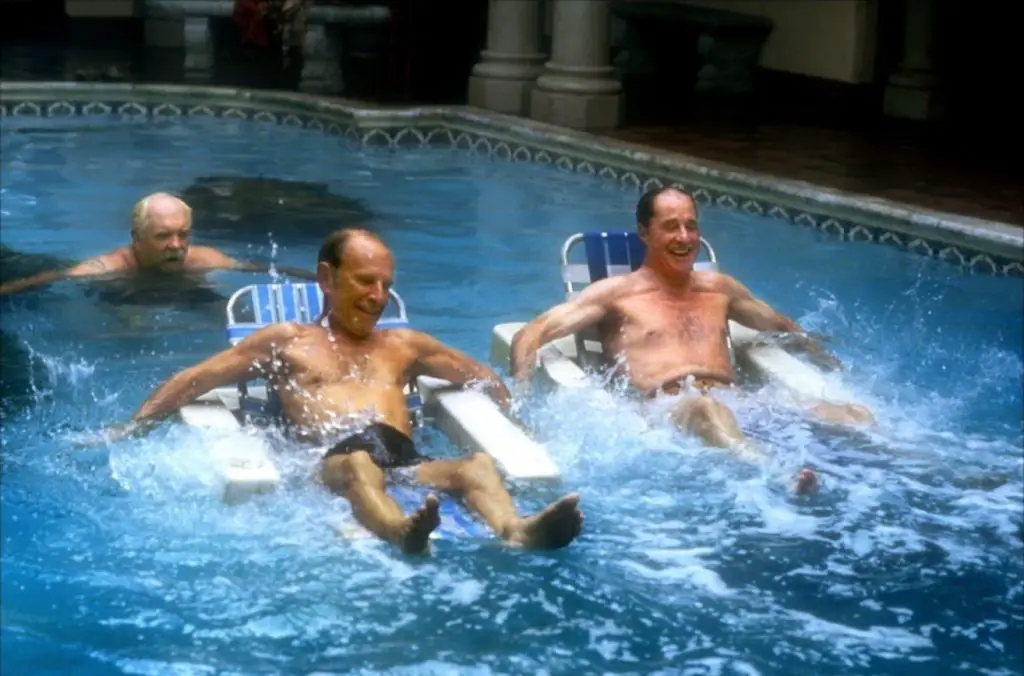
A chance meeting between a professor and a fugitive has unexpected results – a unique friendship in which each aspires to live the life of the other. Dissecting the ambitions and lifestyles of two dissimilar men, director Patrice Leconte creates one of his most fascinating films since the 1996 Academy Award nominee, “Ridicule.” Emphasizing friendship, escapism, and regret, “Man on the Train” is an exceptionally crafted western dream.
Milan is a tough, rugged outlaw on his way to a sparsely populated French town where he is planning to rob a bank. But beneath the rugged exterior, he is suffering from a throbbing headache. After arriving at the train station, he tracks down a local pharmacy in search of some aspirin but picks up the wrong kind by mistake. Instead of returning to the pharmacy, he is intercepted by an elderly man named Manesquier. Manesquier generously offers to help Milan, even offering to put him up for the night; however, Milan politely declines. Shortly after discovering the local hotel and bar are closed, Milan returns to Manesquier’s chateau where he winds up staying until the planned robbery.
Ironically, the robbery is to take place on the same day Manesquier is scheduled to undergo triple bypass surgery. In lieu of both major events, the two men share subtle facts about each other: women, wine, and work. As the two men become more acquainted, one thing becomes increasingly clear: each would prefer to be in the other’s shoes. Manesquier would like to be the mysterious marauder while Milan would like to be the intellectual teacher. Both feed off each other and explore the possibilities – Manesquier dons Milan’s leather jacket and pretends to be Wyatt Earp while Milan takes over a poetry lesson on Balzac for one of Manesquier’s students.
Although neither is equipped to fully realize the other’s profession, each takes the steps to become more like the other. Manesquier gets a modern haircut, slams down his drinks, and learns to fire a gun while Milan smokes a pipe, reads poetry, and enjoys a bath. In doing so, a unique camaraderie and respect is generated between the two. Yet, despite their newfound interests, each must overcome their fears to fulfill their respective destinies. Manesquier must go through with the surgery and Milan must go through with the robbery. Will either have a change of heart? Will they live to see the realization of their dreams?
Director Patrice Leconte is a jack-of-all-trades, covering all types of genres, periods, and styles. He’s shown us the mix between madness and sexual desire in “Monsieur Hire,” he’s explored the relationships of social appearances and political power in “Ridicule,” the oddities of mental illness and circus life in “The Girl on the Bridge,” The Girl on the Bridge a black comedy in “Tango,” and he’s even touched on the action/comedy genre in “Half a Chance.” Thus, trying to identify a single element or word that encapsulates this well-respected French director is a little difficult. I guess you could say that Leconte definitely loves intricate character dilemmas spawned by fateful encounters.
Spanning four decades of cinema, Leconte has collaborated with Jean Rochefort on numerous occasions from “The Mystery of the Yellow Room” to “The Hairdresser’s Husband” to the critically acclaimed “Ridicule.” And with Rochefort, he has explored a similar type of masculine relationship (“Tandem”). But unlike “Tandem” and many other buddy films, “Man on the Train” is refreshing because it does not have any of the neuroses or hang ups of many modern relationships. Manesquier and Milan are not pre-occupied with sex, lies, or egos. Rather, each is open, honest, and direct about their discontented lives and desires. After all, each is leading a lifestyle that the other one wants. And with that comes a mutual understanding, a shared desire, and a friendship.
Benefiting from brilliant interactive dialogue from screenwriter Claude Klotz and fantastic acting, “Man on the Train” is quietly one of the best films of the year. Over the course of the film, you get a true sense for Manesquier and Milan’s yearnings, their regrets, and what it would be like to explore the road not taken. The dialogue is very crisp, very simple, and at times, playfully sarcastic. Asked if he was a successful professor, Manesquier retorts: “Not one pupil molested in 30 years on the job.” When attempting to start a fight, Manesquier runs into a former student: “The first time I go to pick a fight with someone, and it turns out he likes me.” Even the gardener gets in on the act. After startling Manesquier in an Agatha Christie type of way, he replies: “No one expects a gardener!”
To say that opposites attract is an understatement. I don’t think you could get further on either side of the spectrum than Jean Rochefort and Johnny Hallyday. Rochefort is the prototypical French leading actor (with over 80 films under his belt) and Hallyday (also known as the French Elvis) is a former rock star turned actor. Both give such textured performances and their idiosyncrasies are delightful. Rochefort’s Manesquier is quite chatty while Hallyday’s Milan is reserved and speaks only when necessary, though not as infrequent as his partner who only speaks a few words at 10 a.m. each morning. You almost wish that the two could go on an adventure together because the dynamic is thoroughly entertaining.
“Man on the Train” is a masterfully scripted and executed film by one of France’s most prolific and admired directors. Although the ending is a bit disjointed, the way in which Leconte toys with his adverse characters throughout the film is highly inventive. Incorporating fresh dialogue, a spaghetti western like feel, and subtle performances from its leading actors, the film creates a new kind of male friendship – one that is diverse in age, background, and aspiration. It’s stimulating stuff, as mesmerizing as the clackety sound of a train heading off into the wild blue yonder.
